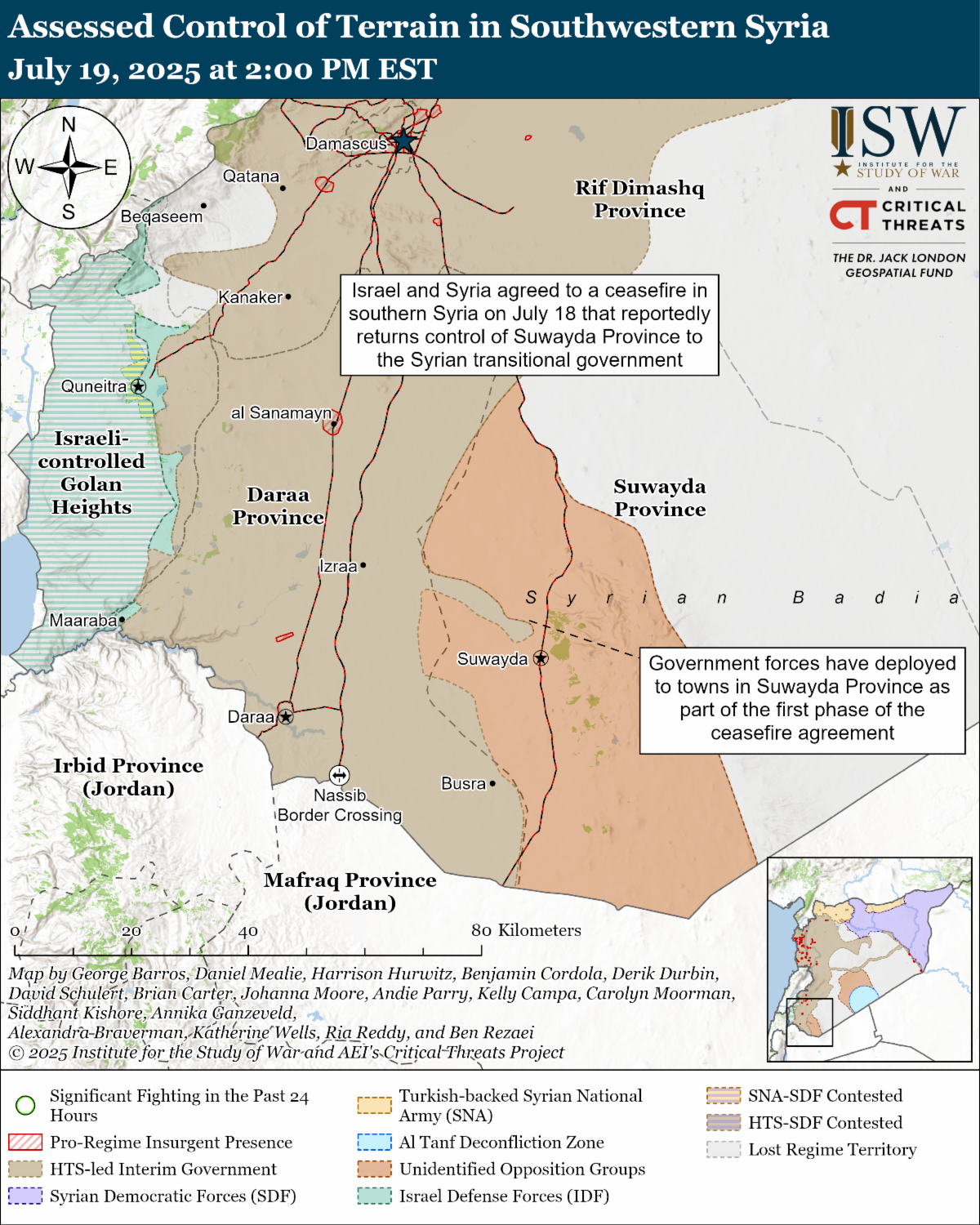Israel and Syria agreed to a ceasefire in southern Syria on July 18 that reportedly returns control of Suwayda Province to the Syrian transitional government. An unidentified Interior Ministry official reported that the ceasefire will be implemented in three phases. Transitional government forces will deploy to Suwayda in the first phase to oversee disengagement between Druze and Bedouin fighters. The official stated that an emergency committee comprised of Syrian transitional government officials will simultaneously oversee the delivery of humanitarian aid and provision of basic services to civilians in Suwayda Province as well as monitor the repair of infrastructure as part of the second phase. The Interior Ministry official stated that the third phase will begin after “calm” is restored in Suwayda Province. The third phase will activate state-run institutions, gradually redeploy government forces to Suwayda Province, and integrate Suwaydawi institutions into the Syrian state. These provisions are similar to the ones that were included in the July 16 ceasefire agreement, which was rejected by prominent Druze Sheikh Hikmat al Hijri.
Syrian President Ahmed al Shara sought to secure the support of the Druze and Sunni Bedouin for the ceasefire during a speech on July 19 by making references to these communities’ history and identity. Shara criticized Hijri’s movement for having “separatist ambitions,” seeking support from abroad, and acting counter to Syrian values and interests. Shara called on Syrians not to judge all Druze based on the actions of a few. He lauded the “noble values” of Bedouin tribes and their history of standing by the Syrian state. Shara stated that the motives for these tribes to take unilateral action to defend themselves are understandable, but cautioned that these actions cannot be an alternative to state intervention to restore security. Shara reiterated the transitional government’s stated commitment to protecting minorities and holding any and all perpetrators of violence accountable.
Hijri, other Druze factions, and Sunni Bedouin tribes have agreed to the Israel-Syria ceasefire in southern Syria. Hijri, who has rejected three ceasefire agreements in the past week, called for his supporters to adhere to the ceasefire agreement. Hijri stated that Syrian government forces would deploy to Suwayda Province’s borders to establish checkpoints. The checkpoints are meant to prevent any parties from entering border villages for 48 hours to allow security forces to deploy to the province and allow Bedouin tribesmen who had traveled to Suwayda to leave the province safely. Under the ceasefire agreement, Busra al Sham and Busra al Harir are designated as safe crossings. Hijri asserted that any party that violates the agreement bears full responsibility for its collapse. It is unclear at this time whether Hijri or his forces will adhere to the ceasefire.
Several Druze and Bedouin groups have welcomed the ceasefire agreement. An unspecified spokesperson for Syrian Bedouin tribes told Syrian media on July 19 that the Bedouin tribes support the Syrian government and have stopped sending tribal fighters to Suwayda. The Southern Tribes Gathering also expressed its commitment to the ceasefire agreement. Prominent Druze Sheikh Hikmat al Hijri, who has led much of the fighting against the transitional government, called for an end to the clashes and fighting on July 18.
Key Takeaways:
- Israel-Syria ceasefire: Israel and Syria agreed to a ceasefire in southern Syria on July 18 that reportedly returns control of Suwayda Province to the Syrian transitional government. Government forces have deployed to towns in Suwayda Province as part of the first phase of the ceasefire agreement.
- Iranian nuclear negotiations: Senior E3 (the United Kingdom, Germany, and France) and Iranian diplomats are reportedly expected to meet in Europe next week to discuss a possible nuclear deal. Iran has not softened its position on its right to enrich uranium on Iranian soil, which makes it unlikely that Iran will accept a nuclear deal that includes a zero uranium enrichment demand.
| 




 [ISW] 이란 업데이트, 2025년 7월 20일
[ISW] 이란 업데이트, 2025년 7월 20일
 [ISW] 러시아 공세 캠페인 평가, 2025년 7월 19일
[ISW] 러시아 공세 캠페인 평가, 2025년 7월 19일